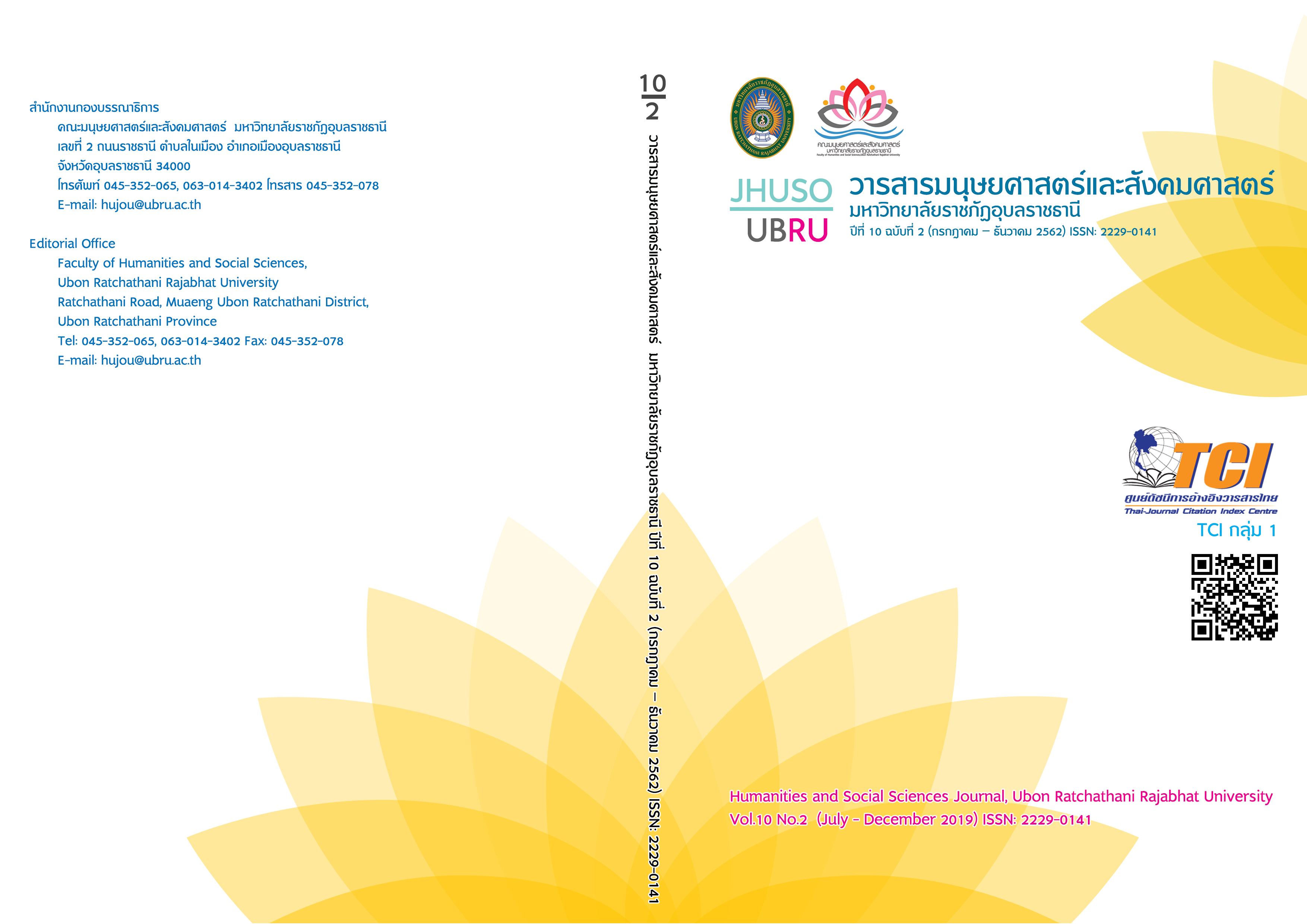อาสาสมัครพนักงานองค์กร : แนวคิด และการประยุกต์
Main Article Content
บทคัดย่อ
บทความนี้มีวัตถุประสงค์ที่จะนำเสนอแนวคิดเกี่ยวกับอาสาสมัครพนักงานองค์กร คือการดำเนินงานด้านอาสาสมัครโดยพนักงานในองค์กร ซึ่งการดำเนินกิจกรรมดังกล่าวต้องเกิดจากความสมัครใจ เพื่อมุ่งช่วยเหลือ แก้ปัญหา และพัฒนาสังคมในมิติต่าง ๆ โดยปัจจุบันองค์กรต่าง ๆ ได้ประยุกต์ใช้แนวคิดอาสาสมัครพนักงานองค์กรเพื่อเป็นเครื่องมือในการแสดงความรับผิดชอบต่อสังคม และการพัฒนาทรัพยากรมนุษย์ขององค์กร ซึ่งการดำเนินโครงการอาสาสมัครพนักงานองค์กรดังกล่าวจะเกิดประโยชน์ต่อทั้ง 3 ฝ่าย คือต่อชุมชนและสังคม ต่อพนักงาน และต่อองค์กร รวมทั้งยังเป็นแนวทางเพื่อบรรลุเป้าหมายการพัฒนาที่ยั่งยืน โดยบทความนี้จะเป็นประโยชน์ในเชิงวิชาการ และในการนำไปประยุกต์ใช้ในองค์กรต่อไป
Article Details
รูปแบบการอ้างอิง
Noonin, S. (2019). อาสาสมัครพนักงานองค์กร : แนวคิด และการประยุกต์. วารสารมนุษยศาสตร์และสังคมศาสตร์ มหาวิทยาลัยราชภัฏอุบลราชธานี, 10(2), 221–233. สืบค้น จาก https://so01.tci-thaijo.org/index.php/humanjubru/article/view/169883
ประเภทบทความ
บทความวิจัย
เอกสารอ้างอิง
เกรียงศักดิ์ เจริญวงศ์ศักดิ์. (2551). งานอาสาสมัคร...สร้างคนสร้างองค์กร. สืบค้นจาก
https://www.kriengsak.com/node/1439
ปิยากร หวังมหาพร. (2556). พัฒนาการเชิงนโยบายอาสาสมัครไทย: จากความมั่นคงสู่การพัฒนาสังคม.
วารสารวิชาการศรีปทุมชลบุรี, 10(2), 15-26.
Allen, A. (2003). The Social case for corporate volunteering. Australian Journal on
Volunteering, 8(1), 57-62.
Allen, K., Galiano, M. & Hayes, S. (2011). Global companies volunteering globally-The final
report of the global corporate volunteering research project. Washington, DC:
International Association for Volunteer Effort.
Boccalandro, B. (2009). Mapping success in employee volunteering: The drivers of
effectiveness for employee volunteering and giving programs and Fortune 500
performance. Chestnut Hill, MA: College Center for Corporate Citizenship.
Brammer, S., Millington, A. & Rayton, B. (2007). The contribution of corporate social
responsibility to organization commitment. International Journal of Human Resource
Management, 18(10), 1701-1719.
Cross Fields. (2016). Cross Fields Activity Report. Tokyo: Cross Fields.
Ellen, P., Mohr, L. & Webb, D. (2000). Charitable programs and the retailer: do they mix?.
Journal of Retailing, 76, 393-406.
Ellis, J. S. & Noyes, H. (1990). By the people: a history of Americans as volunteers. San
Francisco: Jossey-Bass Publishers.
Kotler, P. & Lee, N. (2005). Corporate Social Responsibility: Doing the Most Good for Your
Company and Your Cause. NJ: John Wiley & Sons Jnc.
Longenecker, O. C., Beard, S. & Scazzero, J. A. (2013). What about the workers? The workforce
benefits of corporate volunteer programs. Development and Learning Organizations,
27(1), 9-12.
Meijs, L. C. P. M. & van der Voort. (2004). Corporate volunteering: From charity to profit-
nonprofit partnerships. Australian Journal on Volunteering, 9(1), 21-31.
Matten, D. & Moon, D. (2008.) “Implicit” and “Explicit” CSR: A conceptual framework for a
comparative understanding of corporate social responsibility. Academic of
Management Review, 33(2), 404-424.
McWilliams, A. & Siegel, D. (2001). Corporate social responsibility: A theory of the firm
perspective. Academy of Management Review, 26(1), 117-127.
McWilliams, A. & Siegel, D. (2011). Creating and Capturing Value: Strategic Corporate Social
Responsibility, Resource Based Theory and Sustainable Competitive Advantage. Journal of Management, 37(5), 1480-1495.
Mozes, M., Josman, Z. & Yaniv, E. (2011). Corporate social responsibility organizational
identification and motivation. Social Responsibility Journal, 7(2), 310-325.
Pajo, K. & Lee, L. (2011). Corporate-sponsored volunteering: a work design perspective. Journal
of Business Ethics, 93(3), 476-482.
Porter, M. E. and Kramer, M. R. (2006). Strategy and society: The Link between Competitive
Advantage and Corporate Social Responsibility. Harvard Business Review, 84, 78-92.
Sanchez-Hernandez, I. M. & Gallardo-Vázquez, D. (2013). Approaching corporate volunteering in
Spain. Corporate Governance, 13(4), 397-411.
Wilson, J. (2000). Volunteering. Annual Reviews of Sociology, 26, 215-240.
https://www.kriengsak.com/node/1439
ปิยากร หวังมหาพร. (2556). พัฒนาการเชิงนโยบายอาสาสมัครไทย: จากความมั่นคงสู่การพัฒนาสังคม.
วารสารวิชาการศรีปทุมชลบุรี, 10(2), 15-26.
Allen, A. (2003). The Social case for corporate volunteering. Australian Journal on
Volunteering, 8(1), 57-62.
Allen, K., Galiano, M. & Hayes, S. (2011). Global companies volunteering globally-The final
report of the global corporate volunteering research project. Washington, DC:
International Association for Volunteer Effort.
Boccalandro, B. (2009). Mapping success in employee volunteering: The drivers of
effectiveness for employee volunteering and giving programs and Fortune 500
performance. Chestnut Hill, MA: College Center for Corporate Citizenship.
Brammer, S., Millington, A. & Rayton, B. (2007). The contribution of corporate social
responsibility to organization commitment. International Journal of Human Resource
Management, 18(10), 1701-1719.
Cross Fields. (2016). Cross Fields Activity Report. Tokyo: Cross Fields.
Ellen, P., Mohr, L. & Webb, D. (2000). Charitable programs and the retailer: do they mix?.
Journal of Retailing, 76, 393-406.
Ellis, J. S. & Noyes, H. (1990). By the people: a history of Americans as volunteers. San
Francisco: Jossey-Bass Publishers.
Kotler, P. & Lee, N. (2005). Corporate Social Responsibility: Doing the Most Good for Your
Company and Your Cause. NJ: John Wiley & Sons Jnc.
Longenecker, O. C., Beard, S. & Scazzero, J. A. (2013). What about the workers? The workforce
benefits of corporate volunteer programs. Development and Learning Organizations,
27(1), 9-12.
Meijs, L. C. P. M. & van der Voort. (2004). Corporate volunteering: From charity to profit-
nonprofit partnerships. Australian Journal on Volunteering, 9(1), 21-31.
Matten, D. & Moon, D. (2008.) “Implicit” and “Explicit” CSR: A conceptual framework for a
comparative understanding of corporate social responsibility. Academic of
Management Review, 33(2), 404-424.
McWilliams, A. & Siegel, D. (2001). Corporate social responsibility: A theory of the firm
perspective. Academy of Management Review, 26(1), 117-127.
McWilliams, A. & Siegel, D. (2011). Creating and Capturing Value: Strategic Corporate Social
Responsibility, Resource Based Theory and Sustainable Competitive Advantage. Journal of Management, 37(5), 1480-1495.
Mozes, M., Josman, Z. & Yaniv, E. (2011). Corporate social responsibility organizational
identification and motivation. Social Responsibility Journal, 7(2), 310-325.
Pajo, K. & Lee, L. (2011). Corporate-sponsored volunteering: a work design perspective. Journal
of Business Ethics, 93(3), 476-482.
Porter, M. E. and Kramer, M. R. (2006). Strategy and society: The Link between Competitive
Advantage and Corporate Social Responsibility. Harvard Business Review, 84, 78-92.
Sanchez-Hernandez, I. M. & Gallardo-Vázquez, D. (2013). Approaching corporate volunteering in
Spain. Corporate Governance, 13(4), 397-411.
Wilson, J. (2000). Volunteering. Annual Reviews of Sociology, 26, 215-240.


